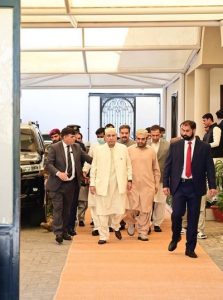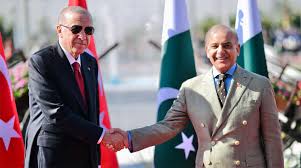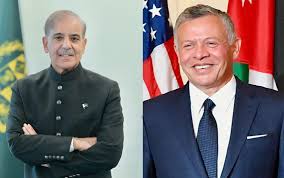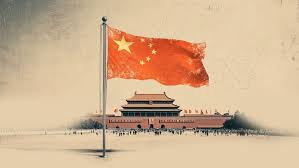73rd Anniversary of Pakistan-China diplomatic relations commemorated

Islamabad: The China Pakistan Study Centre (CPSC) at Institute of Strategic Studies Islamabad (ISSI) organized a commemorative event titled: “73 Years of Pakistan-China Diplomatic Relationship: A Partnership of Peace and Development.”
The panelists included eminent speakers from academia, research and business community. The Embassy of People’s Republic of China was represented by the Deputy Head of Mission, Shi Yuanqiang. Prominent personalities from diplomatic corps, academia, think-tanks and civil society attended.
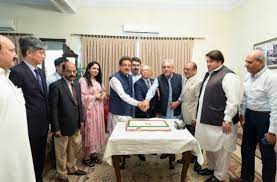
Ambassador Sohail Mahmood, Director General ISSI, emphasized the importance of China-Pakistan relations, founded on mutual respect, strategic trust, and close cooperation.
He stressed that from the very outset, this relationship developed as a special and unique example in interstate relations and has served the best interests of the two countries. Both nations have consistently supported each other on issues of core interest, with Pakistan backing ‘One China’ principle and China’s principled stance on the Jammu and Kashmir dispute.
He added that the Pakistan-China relationship has contributed enormously to the advancement of Pakistan’s national development goals and economic transformation.

He maintained that the China Pakistan Economic Corridor (CPEC) has primarily focused on Pakistan’s infrastructure, energy sector, Gwadar Port, and industrialization.
“The second phase of CPEC will focus on growth corridor, livelihood enhancing corridor, innovation corridor, green corridor, and open corridor. The Prime Minister’s forthcoming visit would help take this process forward. Lastly, he emphasized that it is time to craft a long term vision of Pakistan-China relations, and agree on where they wish to see this vital relationship 25 years from now,” he said.
In this enterprise, he stressed, it was important to engage the youth in both countries as well.

Earlier, Dr. Talat Shabbir, Director China Pakistan Study Centre ISSI, highlighted the history of Pakistan-China relations, noting Pakistan’s steadfast support for the ‘One China’ principle and China’s support for Pakistan’s sovereignty and territorial integrity.
He emphasized the importance of China’s investment in Pakistan’s energy, infrastructure, economic impact of CPEC, and cultural bonds through numerous exchange programmes, and Confucius Institutes. He reiterated the commitment to strengthen ties in technology, innovation, and green development, while celebrating 73 years of exemplary friendship.
The Deputy Head of Mission of the Embassy of People’s Republic of China, Shi Yuanqiang, in his remarks emphasized on how the Pakistan-China relationship has remained strong for 73 years, encompassing economic and strategic cooperation. China eagerly anticipates the Prime Minister’s visit to China, he informed the audience, emphasizing strengthened cooperation.
According to him, the China-Pakistan Economic Corridor has spurred development in Pakistan and attracted foreign investment. He also reiterated that China supports Pakistan’s territorial integrity as Pakistan supports the ‘One-China’ principle. Both nations are advancing cooperation in space programs and accelerating development projects, he stated. Going forward, he specifically stressed the importance of further deepening strategic trust; enhancing practical cooperation; carrying forward traditional friendship through P2P exchanges; and working together to promote multilateralism.
Raja Amir Iqbal, entrepreneur and former President of the Rawalpindi Chamber of Commerce and Industry (RCCI), highlighted China’s rise as a global trade and manufacturing power. He urged Pakistan to learn from China’s success to boost its own economy.
He underlined the importance of the second phase of the China-Pakistan Free Trade Agreement (CPFTA), signed on April 28, 2019. He encouraged small and medium enterprises (SMEs) to pursue joint ventures, calling CPEC a game-changer for Pakistan. Despite challenges like policy gaps, political instability, rupee devaluation, and IMF restrictions, he stressed the need for closer collaboration including in matchmaking events to facilitate joint ventures.
In his speech, Dr Hassan Daud Butt highlighted the enduring Pakistan-China friendship, evident in infrastructure projects like the Hakla-Yarik motorway. This relationship, based on mutual respect and shared values since 1951, has fostered peace, stability, and sustainable development. CPEC has advanced science, technology, and social development, with increased people-to-people connections through language learning and cultural exchanges, he added.
He emphasized that the Pakistan-China bond is more than a partnership; it is a brotherhood with trusted interests, poised to enhance social development over the next 73 years.
Dr. Ghulam Jillani shared his experience working on agricultural research in China. “Some key highlights in Pakistan-China agricultural cooperation has been Pakistan’s import of agri-chemicals and the hybrid rice seed from China. Moreover, Pakistan has variety of agricultural products. The products such as spices and staple foods which China imports every year from other countries can be exported by Pakistan,” he said.
He also emphasized that to further promote agriculture we need to get modern machinery. The existing large machinery cannot employ big machinery because of geographical landscape in hilly areas. China has the same terrain and it uses smart machinery for agriculture.
Dr. Bilal Zubair in his remarks stated that strong cultural ties and people-to-people contacts have existed between both countries even before 2000 years ago. Regular bilateral cultural exchange between both countries started in 1979, and today over 30,000 Pakistani students study in China. The 18th National Congress in 2012 emphasized sharing Chinese culture and public diplomacy, which Pakistan values greatly. He also emphasized on fostering other areas of people-to-people cooperation, for example, cooperation in racket sports in which China holds considerable expertise.
In the end, Ambassador Khalid Mahmood, Chairman BOG ISSI, pointed out that the journey of Pakistan-China relations has been a glorious one. “Notwithstanding the different culture, language and ideological moorings, the friendship between both countries has matured into a strategic partnership. This has been possible because the Pakistan-China relationship has been built upon mutual trust and the five principles of peaceful coexistence,” he mentioned. He also called upon guarding and preserving the all weather strategic cooperative friendship for generations to come.

